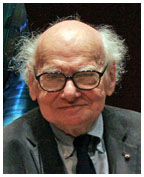Remembering Milton Babbitt (1916-2010)

I'm very saddened to hear of Milton Babbitt's passing. He was the first composer I ever encountered and the one who's most fascinated me. Doubtless there will be some articles written this week which more thoroughly critique Babbitt's aesthetic stance and prognosticate on his legacy (be kind folks!). And there are, of course, many former students and colleagues who had much closer and more extended relationships with Milton than did I. But as a way of remembering him today, I'd like to share a few memories of some of my meetings with Milton.
I first met Milton when I was in high school. He was giving a talk about his piano music at a high school on Long Island (Robert Taub was on hand to demonstrate). Knowing that I had made some fledgling attempts at composing, my mother suggested we go to the talk. It was mind blowing. I'd never experienced music - or discourse - like it.
Hearing his music without any previous exposure left me baffled, but eager to learn more. I went to the local public library, checked out Contemporary Composers on Contemporary Music and study scores by Schoenberg, Stravinsky, Ives, and Babbitt (his 2nd Quartet and Philomel - still two of my favorites) - and began to teach myself about Twentieth Century music. I can honestly say that without attending that event, a whole world of music might not have crossed my path.
I later got to hear several of Milton's lectures when I was an undergraduate student at the Juilliard School. He was also kind enough to look at my scores. Even though I wasn't writing particularly post-tonal music at that point in time, he didn't try to "convert" me; on the contrary, he was very kind and constructive in his comments. That was my first clue that the whole "serial tyranny" jeremiad was bunk, at least where Milton was concerned.
Another fond memory comes from the summer of 1999. By that time, I was studying with Charles Wuorinen at Rutgers and was busily honing my twelve tone chops. At the Music X festival in Cincinnati, Bob Thomas, Luke Palmer, and I - being the only burgeoning dodecaphonists among the assembled composers - got to spend a great deal of time with Milton. He gave us lessons, lectured, gave masterclasses, and even went out to eat with us. I remember him getting a sausage and peppers sandwich and a good domestic beer!
After writing about Milton's music and writings on several occasions for Splendid Magazine, I'm grateful to have had the opportunity in 2006 to interview him for a print feature celebrating his 90th birthday that appeared in Signal to Noise Magazine. We titled it "He Cares if You Listen." One of the things that I've been most glad to write was that long overdue correction!
In the liner notes for a Bridge release, William Anderson wrote that he once heard Milton say, "We transcend nothing." I remember being profoundly unsettled by that quote, not just because I disagree with it philosophically, but because I hoped that Milton realized how many lives he'd touched. No matter what one's persuasion in terms of spirituality or worldview, we do transcend our own mortality in this sense: memories of us live on in those we have affected.
Milton's work as a teacher, eloquence as a writer, and his beautiful music have affected many: multiple generations of scholars, performers and, of course, composers. Our memories of him will live on and not just in our own reflections. They will also live on in the work that we do. In that sense, Milton's life has been profoundly transcendent.
Thank you Milton, and Requiescat in pace.
